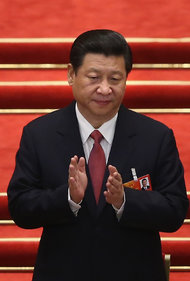 Feng Li/Getty Images Xi Jinping, the newly elected president of China.
Feng Li/Getty Images Xi Jinping, the newly elected president of China.
Cyberthreats featured prominently in President Obama’s congratulatory call to the new Chinese president, Xi Jinping, on Thursday.
The president used the occasion to discuss the loss of United States intellectual property from cyberattacks. The mere mention of cyberthreats is a step forward for an administration that has been reluctant to confront Beijing on Chinese military attacks even as billions of dollars’ worth of trade secrets have been stolen.
But a spate of recent headlines about Chinese cyberattacks on The New York Times, The Washington Post, The Wall Street Journal and others have thrust the issue on the diplomatic stage. A report by Mandiant, a computer security firm, tying hundreds of attacks back to one Chinese military unit, made the issue even harder to ignore.
Mr. Obama has been increasingly vocal about cyberthreats, but has not gone as far as to call out China by name. In his State of the Union address, he was careful to omit China when he said “we know foreign countries and companies swipe our corporate secrets.” And when the Obama administration sent the nation’s Internet providers a confidential list of Internet addresses tied to a hacking group that had stolen terabytes of data from American corporations, it failed to mention that every single address could be traced to the Chinese military cybercommand.
But privately, administration officials have said they plan to tell China’s new leaders that the volume and sophistication of Chinese cyberattacks have become so intense that they threaten the relationship between Washington and Beijing.
“In any discussion with China, the U.S. needs to have three agenda items: One, cybersecurity; two, cybersecurity; and three, cybersecurity,” Mike Rogers, the Republican chairman of the House Intelligence Committee, said in an interview.
China has long denied that it is responsible for cyberattacks on American companies and has said that it too is a victim of such attacks. And in discussions with American officials, Chinese representatives often refuse to discuss economic espionage.
“They say that the topic of economic espionage is ‘embarrassing’ for them,” said James A. Lewis, a cybersecurity expert at the Center for Strategic and International Studies, who has participated in such discussions. “They say, in the U.S. cyberwarriors are treated as heroes but those who participate in economic espionage are treated like criminals. In China, the line is not so clear.”
Article source: http://bits.blogs.nytimes.com/2013/03/14/cyberattacks-prominent-in-obama-call-with-new-chinese-president/?partner=rss&emc=rss


